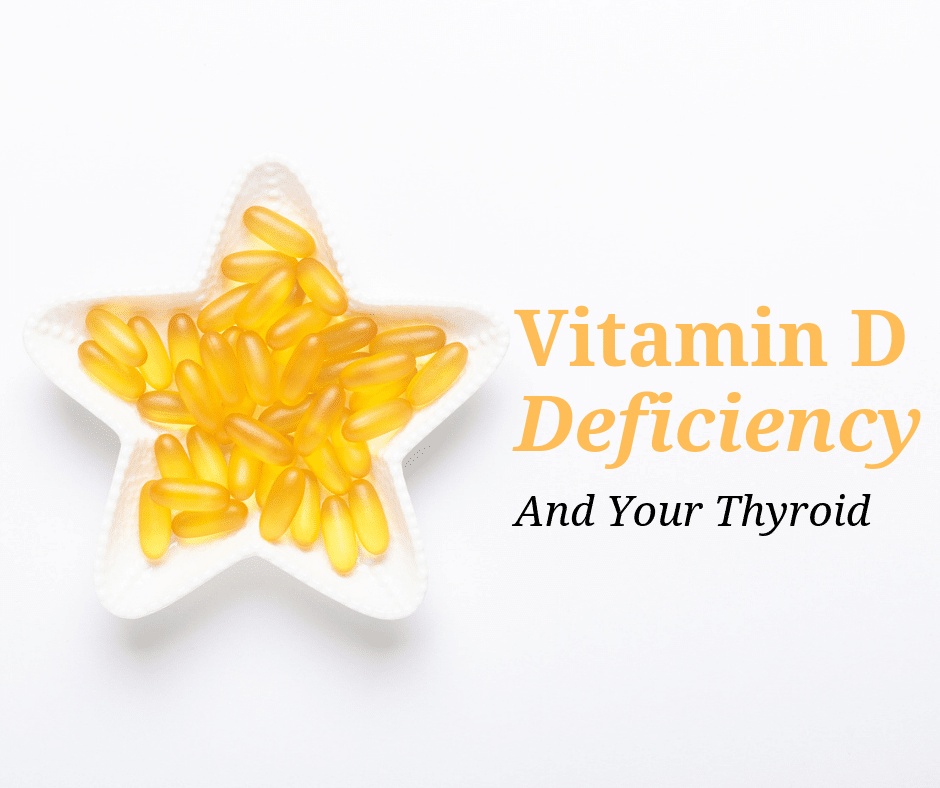It’s estimated that at least 75% of Americans are deficient in Vitamin D. Ironically, Vitamin D isn’t a vitamin at all, but a steroid hormone responsible for a number of processes in the body, ranging from regulating mineral absorption to disease prevention and gene expression.

With the growing epidemic of thyroid disease, it’s vital that we understand how important Vitamin D is for proper thyroid hormone production.
Two of the most common and important forms of Vitamin D are Vitamin D2 and D3.
Vitamin D2 is found in some plant foods and has only about an 8% positive effectiveness in the body. There’s also a synthetic version of D2 made by irradiating fungi and plant matter. This is the form of Vitamin D most often prescribed by doctors in the U.S.
Unfortunately, Vitamin D2 is what you’re most likely to find in the majority of supplements on the market.
To make matters worse – Vitamin D2 is toxic in excess and can cause a softening of the hard tissues and a hardening of the soft tissues in the body. I would encourage anyone considering a D supplement to do your research and make sure you are not getting D2.
Note: For several years, the dairy industry used D2 in their fortified milk products, but has since replaced it with D3. However if you are drinking fortified imitation milks such as soy, rice, almond, or oat – you are most likely still being exposed to D2.
Vitamin D3 is a fat-soluble vitamin and obtained from sun exposure and from certain animal foods. (see the list below)
Here’s how Vitamin D influences thyroid hormone balance:
- In order for iodine to be used to create thyroid hormones, Vitamin D needs to be available. Without adequate Vitamin D, you will often see a decrease in FT4 and/or FT3.
- Several clinical studies have reported low Vitamin D in those with Hashimoto’s or Graves’ disease, indicating an association between Vitamin D deficiency and thyroid autoimmunity.
- Impaired Vitamin D signaling has been reported to encourage thyroid tumorigenesis.
- Vitamin D deficiency has been strongly associated with higher TSH levels (aka: hypothyroidism).
- Vitamin D regulates insulin and balances blood sugar. When blood sugar is imbalanced, this can cause thyroid hormones to go off balance.
Most people just want to take a supplement, but it’s not always that clear-cut. Here are a few reasons why…
Genetic Polymorphism
Each person has a Vitamin D receptor (VDR) in the body that must be activated in order for Vitamin D to perform its functions. Many people with thyroid disease have a genetic VDR mutation that can create Vitamin D deficiency even if levels are normal.
If you have a VDR mutation, then you often need to have higher than normal blood levels of Vitamin D to avoid the effects of Vitamin D deficiency.
Nutrients Work Together
It’s also important to understand that nutrients like Vitamin D and Vitamin K work synergistically together, so f you take too much Vitamin D, you can throw off Vitamin K levels and vice-versa.
Fat Digestion Problems
Vitamin D is a fat-soluble vitamin, so if you don’t eat enough fats or don’t digest fats properly, then you can create a deficiency. People on low-fat diets or those with digestive conditions that impair fat absorption such as IBS, fatty liver disease, gall bladder disease, IBD, etc. are more likely to have low levels of Vitamin D.
Why You Should Stay Away from Conventional Vitamin D Supplements
The majority of Vitamin D supplements you’ll find at your local vitamin store or in the vitamin aisle of the supermarket will only offer you Vitamin D2 or a mix of D2 and D3, and as we said before, D2 can have a negative impact on your health.
Vitamin D cannot be adequately synthesized in your body without its cohorts – Vitamin K2 and Vitamin A (retinol). Most vitamin manufacturers are just looking to make a profit, without actually knowing the ins and outs of true nutrition and will not provide you with the right supplementation.
Vitamin D taken without the necessary K2 will lead to Vitamin D toxicity. Vitamin K2 is responsible for activating certain proteins which are responsible for distributing Vitamin D and calcium to where it should be (in your bones), and keeping it out of where it should not be (in your arteries).
Vitamin A curbs the excessive production of Vitamin K2 proteins to ensure you have just the right amount.
As you can see, these nutrients all work together, so you never want to just take one in isolation because you can throw the others off balance!
Eating foods rich in fat-soluble vitamins is a great way to get the proper balance of these nutrients as they are found in nature.
Here’s a list of Vitamin A, D and K2 rich foods:
- Pastured egg yolks
- Pastured butter
- Grass fed beef
- Liver and organ meats from pastured animals
- Raw milk
- Raw cream
- Oily fish (mackerel, tuna group, herring, anchovies, wild salmon, sardines, herring)
- Cod liver oil
- Animal fat from pastured animals (such as butter, ghee, lard, tallow, or duck fat)
How to Get Enough Vitamin D to Help Keep Your Thyroid Balanced:
1. Eat foods that are rich in Vitamin A, D3, and K2 on a regular basis. (see list above)
2. Get 20-30 minutes of unfiltered sunlight daily (without sunscreen). It’s best to go out in the middle of the day when the sunlight is the strongest.
3. If you’re concerned that you may have a Vitamin D deficiency, I recommend getting tested by your practitioner.
Most people are able to increase their Vitamin D levels within 30-90 days through proper whole food supplementation and can keep them at normal levels through a whole food, nutrient dense diet going forward.
4. Get tested to see if you you have a VDR polymorphism. If you have this mutation, then it’s very important that you get plenty of sunlight and also regularly eat animal foods that are rich in the fat-soluble vitamins A, D and K2.
Recommended Vitamin D Supplementation:
- Standard Process Cod Liver Oil is a good option along with the tips listed above. Keep in mind that it doesn’t contain Vitamin K, so you’ll want to make sure to eat foods containing Vitamin K (from butter, chicken, eggs, raw cheese, organ meats, raw sauerkraut, etc.) to keep things balanced.
If you’d like to learn some first steps you can take to help support your thyroid, check out my class, “3 Keys to Thyroid Hormone Balance”. It’s just 45 minutes and I promise you’ll learn something new!
Note: The purpose of this post is to give an overview of vitamin D and thyroid disease from a holistic perspective. This information is not intended to take the place of your doctor’s advice.







22 Comments